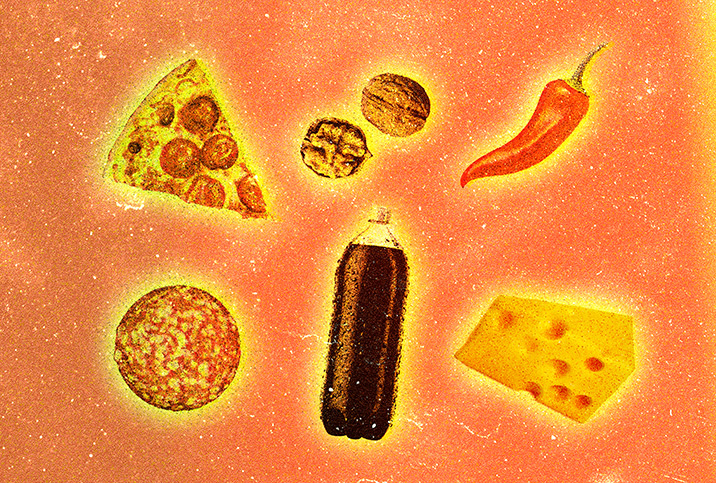What Are the 6 Worst Foods for Prostate Health?

Eating a balanced diet and making time for exercise is vital to any wellness routine, including one focused on prostate health. Knowing the foods that are bad for your prostate can give you an advantage.
After all, prostate-related health issues are among the most common concerns for men. They include benign prostatic hyperplasia (BPH), prostatitis and chronic pelvic pain syndrome (CPPS).
These conditions could be slowed, treated or possibly avoided by staying away from certain foods that irritate the prostate.
Then there's prostate cancer. One in 8 men will be diagnosed with the disease during their lifetime, which amounts to about 268,000 new cases and 34,500 deaths annually, despite the cancer being highly treatable.
Here are six of the worst foods for prostate health you should seriously consider reducing—or staying away from altogether—to increase your chances of avoiding any prostate conditions.
1. Fatty foods
Some fatty foods contribute positively to prostate health:
- Salmon (rich in omega-3 fatty acids)
- Walnuts
- Cod
Monounsaturated fats, such as the ones found in chia and flax seeds, are also good for prostate health.
Other types of fat, though, aren't so great.
Trans fats and saturated fats are the worst offenders, according to Hana Patel, M.B.B.S., a general practitioner and mental health coach in London.
"Choose healthy fats and avoid trans fats in fast and packaged foods," she said.
Packaged and fast foods are typically where most trans fats are found. Recent efforts have been made to reduce trans fats in the food supply because of increasing concerns about their health risks, which include heart disease and the risk of prostate cancer.
2. Sodium-packed foods
"A high salt intake can also affect prostate health, so try and limit canned and processed foods and look at portion sizes to be mindful of the recommended intake," Patel said.
Table salt does play a role, but according to the Centers for Disease Control and Prevention (CDC), the majority of sodium in your diet likely comes from packaged foods:
- Canned soup
- Chips
- Bread
- Cold cuts
- Cured meats
- Pizza
- Cheese
- Other fast and processed foods
Sodium can increase the risks and effects associated with BPH, such as lower urinary tract symptoms and infections. Recent research published in the journal Nutrients indicated that sodium-packed, processed foods increase the overall risk of developing prostate cancer.
You don't have to give up pizza night or charcuterie boards, but balance your diet by keeping foods that irritate the prostate to a minimum and stocking up on fresh fruits and vegetables. Drinking enough water can reduce risks, too.
3. Processed meats
"Red or processed meat and fatty meats might increase prostate health risk," said Delmer A. Montoya, M.D., a medical oncologist with Arizona Oncology in Tucson. "[But] we need more research to better understand their effect on prostate cancer."
High levels of trans and saturated fats and high sodium, both of which contribute to poor prostate health, can be found in red meats, processed meats and fatty meats. Recent research published in Frontiers in Nutrition found that consuming high amounts of processed meat might be associated with an increased risk of prostate cancer.
However, as Montoya pointed out, more research is necessary to determine the exact causes and links between meat consumption and prostate problems.
4. Sugary foods and drinks
Patel recommended avoiding drinks with added sugar, especially fizzy drinks, and looking at the sugar content in fruit juices. Research published in the British Journal of Nutrition suggested that a higher intake of sugary beverages is associated with an increased risk of prostate cancer, though the same association was not found with fruit juice or desserts.
However, additional research shows that the higher your sugar intake, the higher your serum prostate-specific antigen (PSA) levels may be. Checking serum PSA levels is a screening tool for prostate cancer that detects the possibility of the disease when it's most treatable (although other conditions may lead to increased PSA levels, too).
5. Dairy
Dairy foods, such as milk, yogurt, kefir and cheese, are packed with nutrients like calcium, magnesium, vitamin D and protein. They all contribute substantially to overall health. In fact, dairy foods often provide much of the calcium and magnesium many people consume.
Some research, though, points to dairy—at least the full-fat kind—as a potential contributor to compromised prostate health. It's one of the foods that should be consumed in moderation to help keep prostate complications at bay.
Dairy has been linked to prostate inflammation in some individuals, according to Anika Ackerman, M.D., a urologist with Garden State Urology in New Jersey. Some research has shown whole milk to be particularly associated with fatal forms of prostate cancer.
It's worth noting the research is contradictory, as other studies suggest no link between dairy consumption and prostate cancer risk. Speak to your doctor to find out what's best for you.
6. Spicy foods
This one may be hard to swallow for those hot sauce lovers out there.
"Spicy foods like hot peppers and chilis can irritate the bladder and prostate, especially in men with a history of prostatitis," Ackerman said.
She added that spicy foods could exacerbate prostate inflammation and worsen symptoms, including burning during urination. If you find spicy foods aggravate your prostate symptoms, it's likely best to avoid them.
However, if spicy foods aren't an issue for you, enjoy capsaicin-containing products as much as you wish. These foods, including hot peppers, may offer a protective effect against prostate cancer.
Moderation is the key
In most cases, only a few foods need to be considered strictly off-limits. Consuming a varied diet is the goal. An easy rule of thumb is that a heart-healthy diet is a prostate-friendly diet.
"We need more research to better understand their effect on prostate cancer, but the recommendation at this time is to choose a low-fat diet, increase the amount of fruits and vegetables, and reduce the amount of dairy products," Montoya said.
Many men might also benefit from the addition of a supplement to their diets, especially one that combines three prostate-friendly herbs in one capsule. Prostate Health vitamins from Giddy Health utilize saw palmetto, stinging nettle and pygeum and were specially formulated to manage prostate size and maintain a healthy urinary flow. Maintaining a healthy weight and exercising are also recommended as means to improve general health and reduce the risk of prostate cancer and other issues.
The first step toward keeping your prostate healthy is a consultation with a healthcare professional, and video visits have become a viable option for most people. Visit Giddy Telehealth to get connected.


















